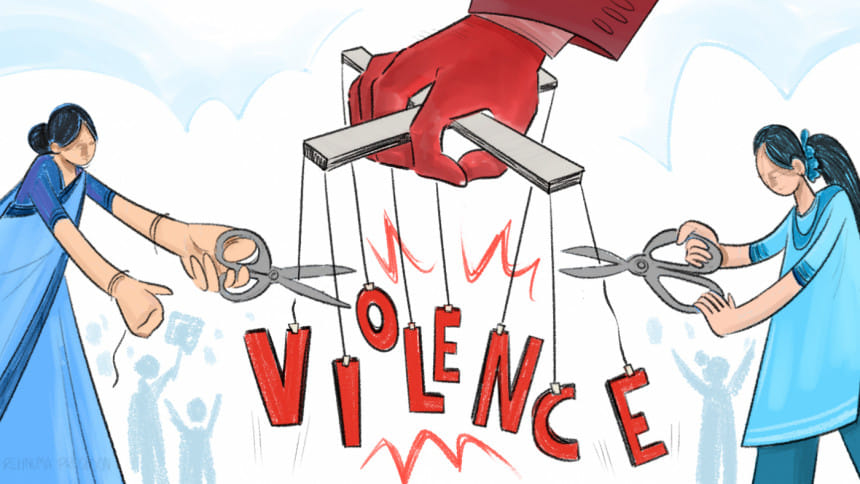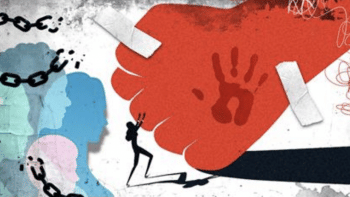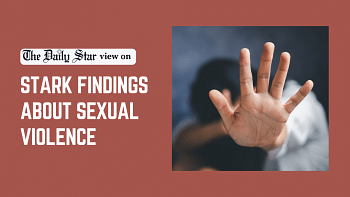The nation still failing its women

Violence against women has long cast a shadow over societies around the world, and here in Bangladesh, it feels like an existential tragedy. The International Day for the Elimination of Violence against Women is meant to bring awareness and drive change, yet every year it arrives as a painful reminder of the progress that remains elusive. There has been a surge in gender-based violence (GBV) cases, each story cutting deeper than the last, a stark reminder that violence against women in Bangladesh is more than a "social issue." It is a national crisis.
Just recently, the body of a woman was found mutilated, in a murder committed by her husband. Cases of women being sexually harassed and assaulted are also on the rise. These incidents are as horrific as they are tragic, but they are only the latest additions to a long history of unchecked violence against women. Globally, violence against women is a horrifyingly common experience, with nearly one in three women—around 736 million individuals—facing physical or sexual violence at some point in their lives. In Bangladesh, at least 50 percent of women report having experienced physical or sexual violence from men in their lives.
The Human Rights Support Society's (HRSS) monthly human rights analysis report revealed that in October 2024 alone, 117 women were victims of violence in Bangladesh. Among them, eight were subjected to gang rape, while seven were killed after being raped. Shockingly, 55 women and girls were victims of rape, with half of them under 18. The report also highlighted 11 cases of sexual harassment, and two murders related to dowry disputes. These figures expose the alarming frequency and severity of GBV in Bangladesh, yet the nation's response remains lukewarm, as if we have now grown numb to these incidents.
As a woman in Bangladesh, these incidents are more than just numbers. Each case feels like a painful reminder of how vulnerable we all are. There is a collective anxiety that looms over us, a fear that no amount of caution or self-defence can fully dispel. It is terrifying to live with this awareness—that as a woman, our very existence makes us a potential target, and that for every violent act reported, countless others remain hidden in silence.
It is not only the frequency of these crimes that shocks me, but the brutality with which they are committed. There is a pervasive culture of impunity that enables this violence, a culture where perpetrators know that they are likely to escape punishment and where the lives of women are treated as expendable. The interim government has done little to address this crisis. We were promised security and progress, but when it comes to women's safety, the silence has been deafening. GBV is not simply an issue of law and order; it is a fundamental human rights crisis. Every day that goes by without reform and justice, is a day when women in Bangladesh are abandoned by their country and left to fend for themselves in a hostile environment.
Despite the occasional outrage, the cycle of violence continues. An incident occurs, it sparks public outcry, demands for justice are made, and then the attention fades until the next horror emerges. This repetitive cycle has desensitised us as a society, and the overall inaction only reinforces the sense that women's lives are not a priority. Yet the suffering is not something we can ignore. The daily fear, the emotional scars, and the sense of betrayal from a system that fails to protect us—these are the burdens we carry, day in and day out.
Today, it feels important to address not just the violence itself, but the systemic failures that allow it to thrive. Violence against women in Bangladesh is not a series of isolated incidents; it is an epidemic rooted in the very fabric of our society. A culture that devalues women, normalises misogyny, and ignores our voices has left us vulnerable and without recourse. The systemic response, or lack thereof, only exacerbates this crisis. The judicial process is fraught with delays, corruption, and bias, often favouring the perpetrators instead of the victims.
Until we see true accountability, until there is real reform, and until this country prioritises the protection and dignity of its women, we are destined to repeat this cycle of violence. The failure to address this epidemic is more than a government oversight—it is a glaring, heartbreaking stain on our collective conscience. We are the ones who need to solve this. We owe it to ourselves, to each other, and to the generations that will follow.
Maisha Islam Monamee is a student of Institute of Business Administration (IBA) at the University of Dhaka and a contributor at The Daily Star. She can be reached at @monameereads on Instagram.
Views expressed in this article are the author's own.
Follow The Daily Star Opinion on Facebook for the latest opinions, commentaries and analyses by experts and professionals. To contribute your article or letter to The Daily Star Opinion, see our guidelines for submission.


 For all latest news, follow The Daily Star's Google News channel.
For all latest news, follow The Daily Star's Google News channel. 









Comments